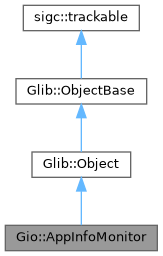|
| | AppInfoMonitor (AppInfoMonitor &&src) noexcept |
| |
| AppInfoMonitor & | operator= (AppInfoMonitor &&src) noexcept |
| |
| | ~AppInfoMonitor () noexcept override |
| |
| GAppInfoMonitor * | gobj () |
| | Provides access to the underlying C GObject.
|
| |
| const GAppInfoMonitor * | gobj () const |
| | Provides access to the underlying C GObject.
|
| |
| GAppInfoMonitor * | gobj_copy () |
| | Provides access to the underlying C instance. The caller is responsible for unrefing it. Use when directly setting fields in structs.
|
| |
| Glib::SignalProxy< void()> | signal_changed () |
| |
| | Object (const Object &)=delete |
| |
| Object & | operator= (const Object &)=delete |
| |
| | Object (Object &&src) noexcept |
| |
| Object & | operator= (Object &&src) noexcept |
| |
| void * | get_data (const QueryQuark & key) |
| |
| void | set_data (const Quark & key, void *data) |
| |
| void | set_data_with_c_callback (const Quark & key, void *data, GDestroyNotify notify) |
| |
| void | set_data (const Quark & key, void *data, DestroyNotify notify) |
| | Prefer set_data_with_c_callback() with a callback with C linkage.
|
| |
| void | remove_data (const QueryQuark &quark) |
| |
| void * | steal_data (const QueryQuark &quark) |
| |
| | ObjectBase (const ObjectBase &)=delete |
| |
| ObjectBase & | operator= (const ObjectBase &)=delete |
| |
| void | set_property_value (const Glib::ustring & property_name, const Glib::ValueBase & value) |
| | You probably want to use a specific property_*() accessor method instead.
|
| |
| void | get_property_value (const Glib::ustring & property_name, Glib::ValueBase & value) const |
| | You probably want to use a specific property_*() accessor method instead.
|
| |
| template<class PropertyType > |
| void | set_property (const Glib::ustring & property_name, const PropertyType & value) |
| | You probably want to use a specific property_*() accessor method instead.
|
| |
| template<class PropertyType > |
| void | get_property (const Glib::ustring & property_name, PropertyType & value) const |
| | You probably want to use a specific property_*() accessor method instead.
|
| |
| template<class PropertyType > |
| PropertyType | get_property (const Glib::ustring & property_name) const |
| | You probably want to use a specific property_*() accessor method instead.
|
| |
| sigc::connection | connect_property_changed (const Glib::ustring & property_name, const sigc::slot< void()> &slot) |
| | You can use the signal_changed() signal of the property proxy instead.
|
| |
| sigc::connection | connect_property_changed (const Glib::ustring & property_name, sigc::slot< void()> &&slot) |
| | You can use the signal_changed() signal of the property proxy instead.
|
| |
| void | freeze_notify () |
| | Increases the freeze count on object.
|
| |
| void | thaw_notify () |
| | Reverts the effect of a previous call to freeze_notify().
|
| |
| virtual void | reference () const |
| | Increment the reference count for this object.
|
| |
| virtual void | unreference () const |
| | Decrement the reference count for this object.
|
| |
| GObject * | gobj () |
| | Provides access to the underlying C GObject.
|
| |
| const GObject * | gobj () const |
| | Provides access to the underlying C GObject.
|
| |
| GObject * | gobj_copy () const |
| | Give a ref-ed copy to someone. Use for direct struct access.
|
| |
Monitor application information for changes.
Gio::AppInfoMonitor is a very simple object used for monitoring the app info database for changes (ie: newly installed or removed applications).
Call get() to get a Gio::AppInfoMonitor and connect to signal_changed().
In the usual case, applications should try to make note of the change (doing things like invalidating caches) but not act on it. In particular, applications should avoid making calls to Gio::AppInfo APIs in response to the change signal, deferring these until the time that the data is actually required. The exception to this case is when application information is actually being displayed on the screen (eg: during a search or when the list of all applications is shown). The reason for this is that changes to the list of installed applications often come in groups (like during system updates) and rescanning the list on every change is pointless and expensive.
- Since glibmm 2.72:

 Public Member Functions inherited from Glib::Object
Public Member Functions inherited from Glib::Object Public Member Functions inherited from Glib::ObjectBase
Public Member Functions inherited from Glib::ObjectBase Related Symbols inherited from Glib::Object
Related Symbols inherited from Glib::Object Public Types inherited from Glib::Object
Public Types inherited from Glib::Object Protected Member Functions inherited from Glib::Object
Protected Member Functions inherited from Glib::Object Protected Member Functions inherited from Glib::ObjectBase
Protected Member Functions inherited from Glib::ObjectBase